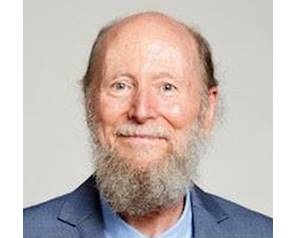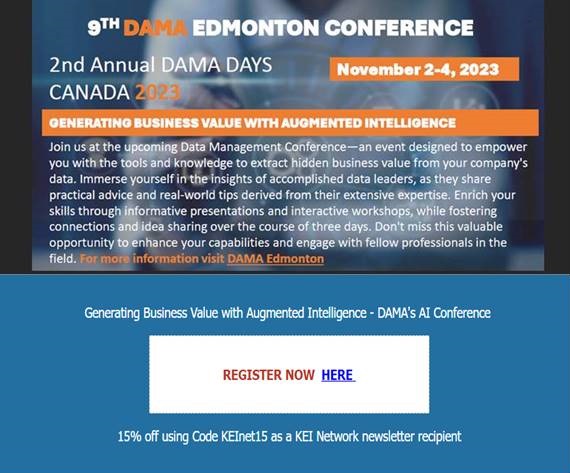|
|
LEADERSHIP - Achieving Artificial General Intelligence - for better or for worse? Public services and personal interests are clashing as we have discussed in Healthcare, Homelessness, and will be discussing re Education and parenting. Can AI help bridge these interests? What is the anticipated impact of Artificial General Intelligence on our future welfare? |
|
Last week - Click below |
WEBINAR Understanding Intelligence by Creating AI for better or for worse? featuring Richard Sutton father of Reinforcement Learning for AI and author of The Alberta Plan 4:00PM MST Thursday November 2nd, 2023 https://us02web.zoom.us/j/82390691947 Calendarize the Webinar HERE for Outlook |
Last week's webinar HERE featured a panel discussion with Perry Kinkaide HOSTING the concluding episode HOMELESSNES - The finale - Prevention & Recommendations. The panel discussion was facilitated by Catherine Latimer - John Howard Society, with former guests: Carol Kane - US group homes and Episode #2, Doug Sedore - Cdn group homes and Episode #3, and guests: Bruce Uditsky - Inclusion Canada, and Sanda Kazazic - Drop In Centres, Toronto. They discuss: 1. Who are the homeless and where do they come from? Then, 2. What does the public want and what do the homeless need? And 3. finally, What can be done in terms of prevention and recovery? As per earlier episodes, the discussion emphasized the critical importance of PERSONALIZATION of the problem, PEER SUPPORT in service, and PREVENTION in public policy. FOR MORE see also HERE drawing on ChatGPT for help in resolving the clash of Public and Private interests in resolving homelessness. - Editor, KEInetwork.net
|
WEBINAR LEADERSHIP - Understanding Intelligence by Creating AI - for better or for worse? Leaders play a critical role in managing change, but they can also be agents in creating change. Who are they and what are their values? We've been tracking our destiny - forecasts of the rapid impact of generative AI on business and policy-making, the workforce and the professions. This week's KEInetwork.net webinar will feature Richard Sutton, following the series about HEALTHCARE (September), HOMELESSNESS (October) and pending, EDUCATION (November). Richard is a global leader in advancing artificial intelligence through the application of reinforcement learning (RL). He is also author of the Alberta Plan HERE - in pursuit of the greatest achievement in the history of mankind - understanding intelligence! Consider ... how continuous learning, a core principle of RL, is not just a computational concept but a societal imperative. The journey from understanding homelessness to reimagining healthcare and education, with the lens of AI and RL, offers a rich narrative that invokes a deeper understanding and a call for thoughtful action in addressing these complex issues. This conceptual bridge not only ties the discussed topics together but also invites a deeper exploration and engagement with how technological advancements, represented by Sutton's work, can be channeled towards addressing pressing societal challenges. Richard Sutton will be joining us for discussing The Alberta Plan and the anticipated impact of achieving Artifiicial General Intelligence. Meet the leader. Share your views. The Zoomed and recorded webinar HERE https://us02web.zoom.us/j/82390691947 begins this Thursday, November 2nd at 4:00PM MST with a rebroadcast of his opening address to DAMA's Annual Conference - see below. |
 Richard Sutton – Research Scientist - Computing Science, University of Alberta and world renown for his contribution of reinforcement learning to the development of artificial intelligence. In 2022 he made public his Alberta Plan HERE https://www.youtube.com/watch?v=iS7dRTge8Z8 in pursuit of the greatest achievement of mankind in history – understanding intelligence. Here is what he has to say about his research interest. “I am seeking to identify general computational principles underlying what we mean by intelligence and goal-directed behavior. I start with the interaction between the intelligent agent and its environment. Goals, choices, and sources of information are all defined in terms of this interaction. In some sense it is the only thing that is real, and from it all our sense of the world is created. How is this done? How can interaction lead to better behavior, better perception, better models of the world? What are the computational issues in doing this efficiently and in real time? These are the sort of questions that I ask in trying to understand what it means to be intelligent, to predict and influence the world, to learn, perceive, act, and think.”
Richard Sutton – Research Scientist - Computing Science, University of Alberta and world renown for his contribution of reinforcement learning to the development of artificial intelligence. In 2022 he made public his Alberta Plan HERE https://www.youtube.com/watch?v=iS7dRTge8Z8 in pursuit of the greatest achievement of mankind in history – understanding intelligence. Here is what he has to say about his research interest. “I am seeking to identify general computational principles underlying what we mean by intelligence and goal-directed behavior. I start with the interaction between the intelligent agent and its environment. Goals, choices, and sources of information are all defined in terms of this interaction. In some sense it is the only thing that is real, and from it all our sense of the world is created. How is this done? How can interaction lead to better behavior, better perception, better models of the world? What are the computational issues in doing this efficiently and in real time? These are the sort of questions that I ask in trying to understand what it means to be intelligent, to predict and influence the world, to learn, perceive, act, and think.”

